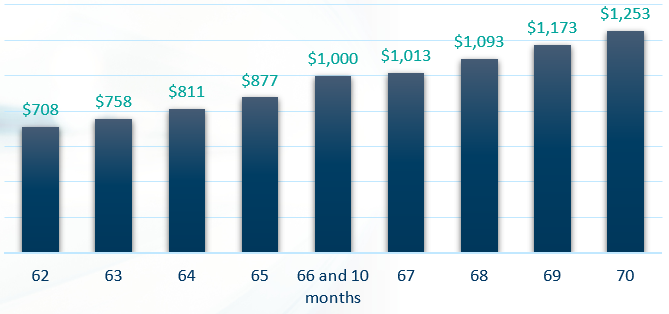When we discussed eligibility for social security in our previous article, Social Security 101: Back to the Basics, we mentioned that individuals can qualify for fully earned social security benefits starting at the age of retirement. Nonetheless, this isn’t the only time you can qualify for these benefits. Knowing when to start claiming social security must be part of your financial planning process. Keep reading to learn more:
Claiming social security benefits
Choosing to start social security at your full retirement age (FRA), the first year you’re eligible to claim this (age 62), or delaying social security until you’re age 70 can mean a huge difference in your projected monthly dollar value. Calculating your break even analysis, which we discuss below, can help you determine the best age to start claiming social security. It is also just as important for each individual to consider various factors in deciding when to apply for social security, such as health status, family health history, marital status, length of time in the workforce, and if you have other sources of retirement income.
Choosing a starting age
*This example from the Social Security and Medicare Boards of Trustees assumes a benefit of $1,000 at a Full Retirement Age of 66 and 10 months. This is a hypothetical illustration and does not predict actual performance.
Break Even Analysis
Leveraging the break even analysis can assist in the decision-making process. This analysis demonstrates at which age your cumulative benefits will likely equal out. This is a best practice for anyone considering waiting to claim social security benefits, as delaying until age 70 can sometimes cause you to wait until age 79 to have benefit payments break even (compared to taking benefits at age 62). There are online calculators that can help determine the break even ages and benefits. Knowing this analysis will aid in deciding when to claim social security – as will answers to the factors we list above and explore next.
What to consider
In addition to understanding your break even analysis, it’s encouraged to consider the following factors when determining whether to claim social security right away or wait.
Marital Status
Married individuals who qualify for their own social security benefit have the option to claim spousal benefits on their partner’s Primary Insurance Amount (PIA). Under this practice, married couples can receive the higher payment of the two benefits. To qualify for spousal benefits, you must be married for over one year, be at least 62 years old, and your spouse must be collecting social security benefits. Other qualifying factors include individuals caring for a child under the age of 16 or a disabled individual.
Life Expectancy
It’s best practice to take social security at the earlier age if family history or your health indicates a shortened life expectancy.
Working Status
If you continue to work past your FRA, then it is often worthwhile to delay social security payments until age 70 or when you retire, as working beyond the FRA and collecting social security will not lessen the benefits of social security. In fact, if you start to collect social security before the FRA and you continue to work, social security benefit could be reduced. The following chart displays how social security benefits are impacted.
Working in Retirement (2022 Earned Income Limits), according to the Social Security Administration
Under FRA: $1 of benefits withheld for every $2 in earnings above the limit for years prior to reaching the FRA
Individual reaches FRA in 2022: $1 of benefits withheld for every $3 in earnings above the limit for months prior to reaching the FRA
Month individual reaches FRA and beyond: Reduction no longer applies
$19,560 annually
$51,960 annually
Unlimited
*Table reflects earnings of the individual claiming benefits.
Income Stream and other Assets
Social security isn’t designed to be a retiree’s only replacement of income. The other assets and sources of income you maintain are considered when you file for social security. Additionally, some people hold assets in a taxable portfolio or an IRA account. If you are considering waiting to take social security until after you reach the FRA, you’ll need to decide if you have enough assets to not harm the longevity of your overall portfolio. You don’t want to deplete your assets too soon.
Key Takeaways
The retirement decision-making process is complex. At Sikich, we have a team that provides retirement planning help, leveraging numerous tools so you see the overall financial picture with a clearer viewpoint. To get in touch with us, please contact us below.
Resource:
“Status of the Social Security and Medicare Programs: A Summary of the 2021 Annual Reports,” Social Security and Medicare Boards of Trustees, 2021.
This publication contains general information only and Sikich is not, by means of this publication, rendering accounting, business, financial, investment, legal, tax, or any other professional advice or services. This publication is not a substitute for such professional advice or services, nor should you use it as a basis for any decision, action or omission that may affect you or your business. Before making any decision, taking any action or omitting an action that may affect you or your business, you should consult a qualified professional advisor. In addition, this publication may contain certain content generated by an artificial intelligence (AI) language model. You acknowledge that Sikich shall not be responsible for any loss sustained by you or any person who relies on this publication.










